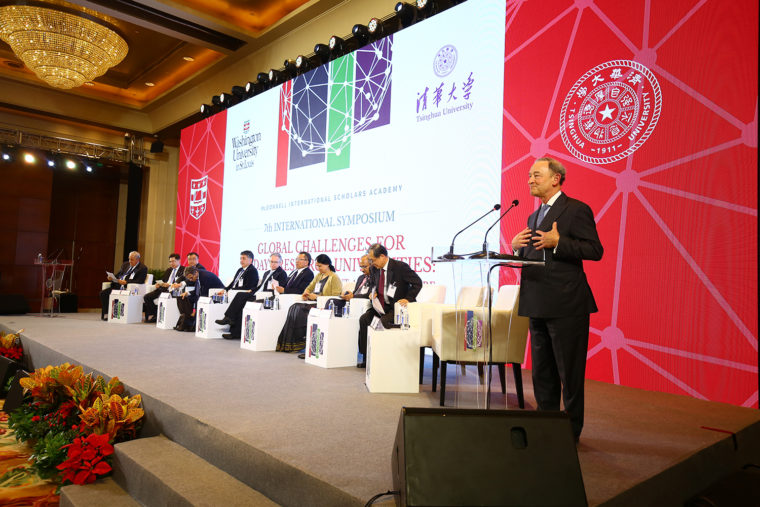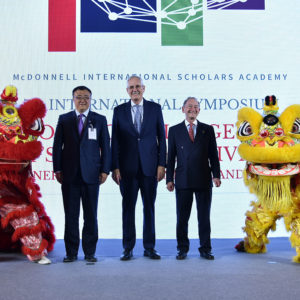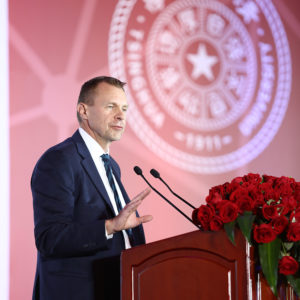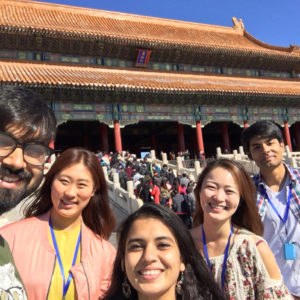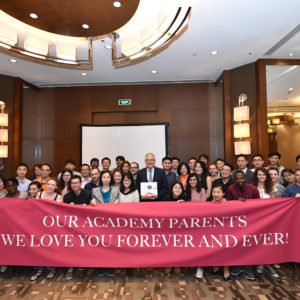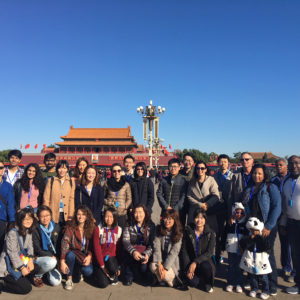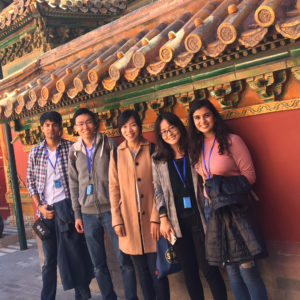Addressing global challenges in a spirit of cooperation and collaboration was the prevailing theme of the 7th McDonnell Academy International Symposium, co-hosted by Washington University in St. Louis and Tsinghua University, and held in Beijing Oct. 11-14.
More than 400 attendees, from 35 McDonnell Academy partners around the world, converged to discuss innovative approaches to address issues such as public health, aging, energy and the environment and agriculture. Administrators, faculty, students and representatives from the public and private sectors contributed to the program and participated in the dialogue. The symposium concluded with 21 McDonnell International Scholars Academy partner universities signing a declaration designed to boost sustainability measures at each of their campuses, the first such agreement of its kind.
“These are important challenges, and no single institution — indeed no single country — will be able to solve all of the problems that we face,” said Washington University Chancellor Mark S. Wrighton during the opening session. “Through collaboration, I believe that we will be able to make great progress.”
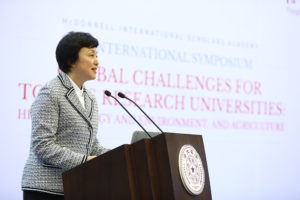
“Actions speak louder than words,” said Qiu Yong, president of Tsinghua University, in a letter read at the opening session by Tsinghua Vice President Yang Bin. “Tsinghua University is dedicated to serving Chinese society and the world community by tackling global challenges head-on. Research institutions have the responsibility to address these problems, and all of the McDonnell Academy universities embody the academic and research excellence.
“By being here, we are committing to working with common purpose, with each other, in order to accomplish great things.”
The three days were packed with executive sessions, workshops, panel discussions and poster sessions featuring research from current McDonnell Scholars. John Holdren, the Teresa and John Heinz Professor of Environmental Policy & Professor of Environmental Science & Policy at Harvard University, gave the opening keynote address.
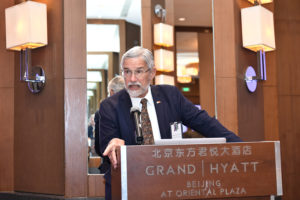
Holdren, who also served as senior adviser to President Barack Obama on science and technology issues, discussed the role of research universities when it comes to educating policymakers and the public about the real risks and impact of climate change.
“The essence of this challenge is that the world has long been getting most of the energy its economies need in ways that are now seriously disrupting the climate that its environments need,” Holdren said.
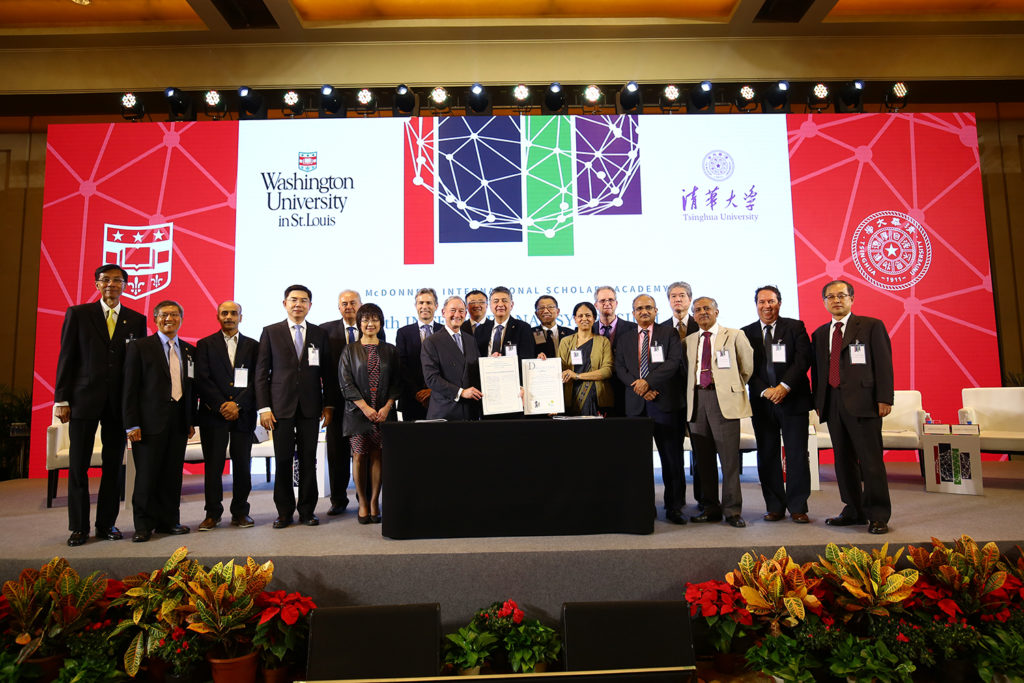
Further underscoring the importance of working together against climate change, several panel discussions and workshops focused on reducing carbon footprint were held during the symposium. The specific role of universities was extensively discussed in an executive session lead by Pratim Biswas, assistant vice chancellor, chair of the Department of Energy, Environmental & Chemical Engineering and the Lucy & Stanley Lopata Professor at the School of Engineering & Applied Science. A total of 21 McDonnell partner universities signed onto a declaration drafted by the McDonnell Academy Global Energy and Environment Partnership, pledging to work together to reduce their collective carbon footprint.
“We are all affected by climate change, and it is imperative to work collaboratively to overcome what many regard as the biggest challenge we face,” Wrighton said.
The aging demographic in China and beyond was also explored in an executive session led by Nancy Morrow-Howell, the Bettie Bofinger Brown Distinguished Professor of Social Policy at the Brown School. Symposium co-host Tsinghua University pointed to the issue as a specific cause for concern.
“In this next generation, people will have a 100 year-life expectancy,” Yong said. “In the future, how should we prepare for the people beyond retirement age? What should they do, and how do we give them a continuing future? In China, one of the big challenges is that gap. That’s why we seek to collaborate to provide opportunities and services for them.”
Scholars take part
McDonnell Academy scholars also played a large role in the three-day event. In addition to the poster sessions that were held, several of them and other graduate students from partner universities took part in a Three Minute Thesis (3MT) competition, where they gave three-minute presentations assisted by just one power point slide.
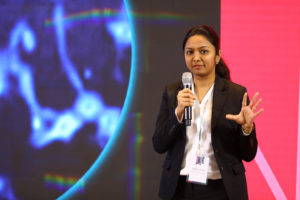
“The symposium is a leadership-building opportunity for our scholars,” said James Wertsch, founding director of the McDonnell International Scholars Academy. “They have had a chance to meet with university leaders, they’ve been able to network. We are preparing them to be global leaders across disciplines who will be able to address these big issues effectively well into the future.”
The symposium’s penultimate day concluded with a president’s forum moderated by Wrighton. The chancellor and 10 other McDonnell partner university presidents gathered to address what they saw as the globe’s grand challenges and discuss how they could be addressed, both individually and collaboratively. Those included the emergence and ethical challenges of artificial intelligence, to public health and environmental concerns.
“Each of the institutions that’s represented in the academy has resources,” Wrighton said. “Resources alone are not going to solve our problems. It’s the combination of resources and leadership that will help us all move forward.”
On to Tsinghua
The collaborative discussions continued Oct. 14 at Tsinghua University, as nearly a dozen workshops were held featuring faculty experts from around the world. Topics included building global health partnerships; social innovation and public health; environmental nanotechnology materials for health and well-being; and policy issues around agriculture and environment.
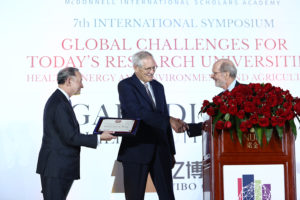
During the closing dinner, Wrighton announced the creation of the James and Mary Wertsch Fellowship for a Scholar, named to honor the academy’s first director who is transitioning from the role and returning to the Washington University faculty this December. At the same event, Kurt Dirks, vice chancellor of international affairs, announced that the 8th McDonnell Academy International Symposium will be held at Washington University in October 2020.
The McDonnell International Scholars Academy was founded at Washington University in 2005. It enrolls top students from partner universities across disciplines, providing them with an excellent graduate instruction as well as leadership training. Its network now includes universities on six continents that regularly work together on research and grand, global challenges.
